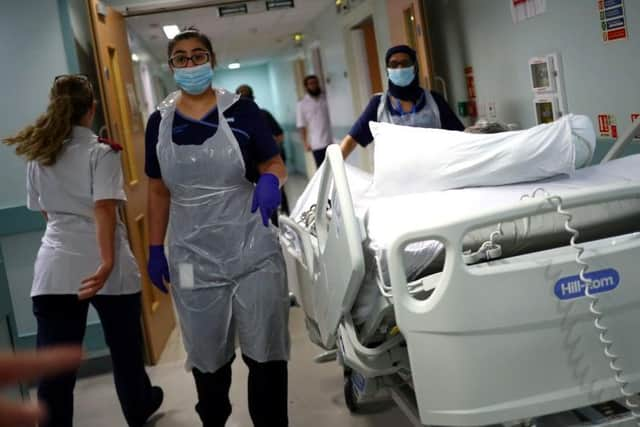Scotland coronavirus death rate third worst in the world
The latest statistics from the National Records of Scotland, which includes deaths where coronavirus is suspected but not confirmed as no test was carried out, place Scotland third worst in the world for the number of Covid-19 deaths for every million people.
With 4,000 deaths from a population of 5.454 million people, the rate of coronavirus deaths in Scotland has reached 733 for every million, behind England on 767 and Belgium on 842. The UK as a whole has the second worst record with 614 deaths for every million people.
Advertisement
Hide AdAdvertisement
Hide AdHowever, the latest statistics did show that the number of deaths had fallen for a sixth consecutive week and the proportion of coronavirus deaths in Scotland’s care homes has fallen below 50 per cent for the first time since mid-April.


Nicola Sturgeon said the 4,000 number was “far higher than any of us would wish” and that the overall downward trend in numbers “did not console all those who have lost loved ones”.
But the First Minister was criticised for other new figures which showed just 18,110 care home staff, around a third of Scotland’s 53,500-strong care home workforce, had been tested for the virus, despite a Scottish Government pledge three weeks ago for universal, routine testing. A total of 15,349 residents, from 35,000, had also been tested.
Scottish Tory leader Jackson Carlaw said that the numbers were “well short” of what was promised by health secretary Jeane Freeman on 18 May, and that the First Minister needed to set a “hard deadline” for having all care home staff tested.
The revelation that only 33 per cent of care home staff had been tested proved, said Mr Carlaw, that “ministers need to get a grip of the situation”.
He added: “NHS Borders is saying it doesn’t have the capacity to carry out tests in care homes in its area. Care home owners in towns like Castle Douglas say none of their staff have been tested unlike those in England a few miles across the Border. Today we learned from Scottish Borders Council they’ve received 480 testing kits to cover all 1,200 staff in care homes.
“With over 50,000 care home staff, [these tests], while welcome, is still well short of the promise made three weeks ago. Ministers need to get a grip of the situation. Will the First Minister commit to setting a hard deadline for delivering those initial tests?”
Ms Sturgeon said she would consider a deadline, and that the government would publish the data of each health board in order to ensure the testing regime was stepped up. She added: “The health secretary and I have been clear we want to see health boards accelerate progress. It’s important we establish this testing on a sound and sustainable basis. This is testing that will happen regularly on an on-going basis so it’s right that health boards make sure it’s carried out quickly and routinely.
Advertisement
Hide AdAdvertisement
Hide Ad“Some of the health board data we are receiving still needs to be validated and then we will look to see whether that [a deadline] is appropriate. This will be on-going testing that will be done week in, week out, for as long as we’re living with this virus.
“In relation to ‘getting a grip’, we’re seeing the numbers of care homes with an active outbreak reducing, the number of new cases reducing, and the number of people dying now reducing rapidly and on a sustained basis. That says to me the actions that are being taken in care homes to protect residents are working.
“Testing is not the only measure, we must be careful not to put all the focus on testing, especially when it comes to asymptomatic people, but it’s a key measure so doing it sustainably is important.”
Comments
Want to join the conversation? Please or to comment on this article.